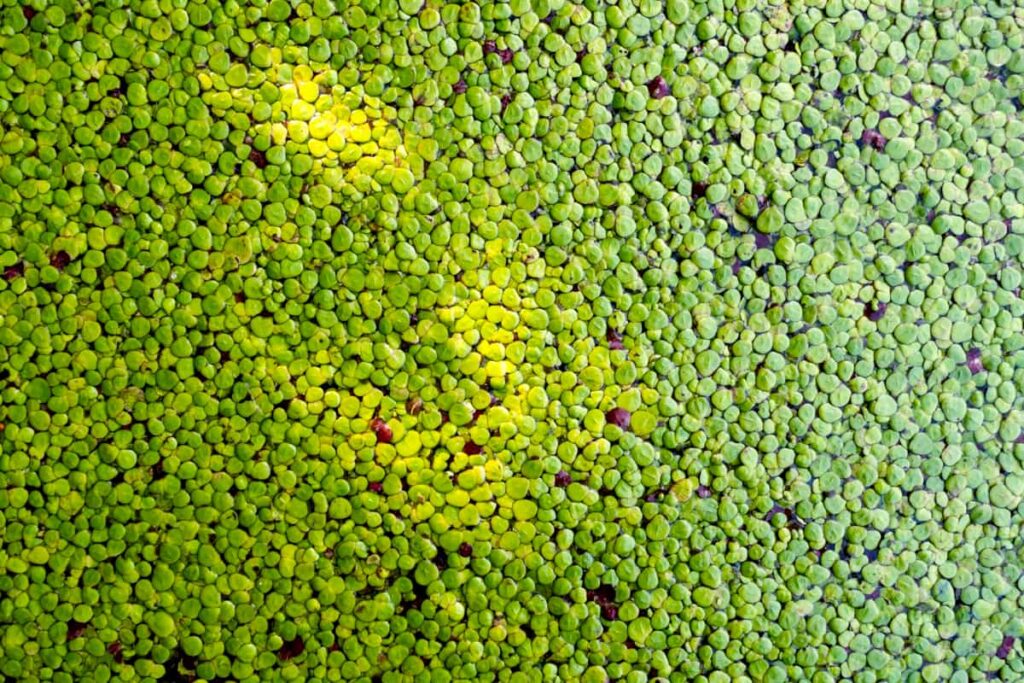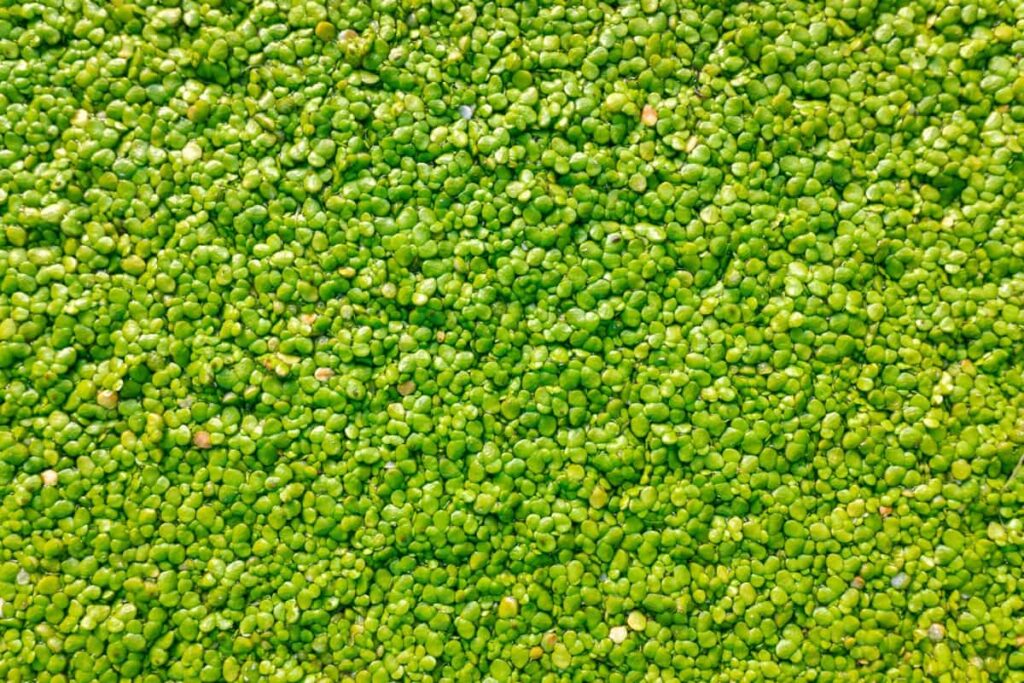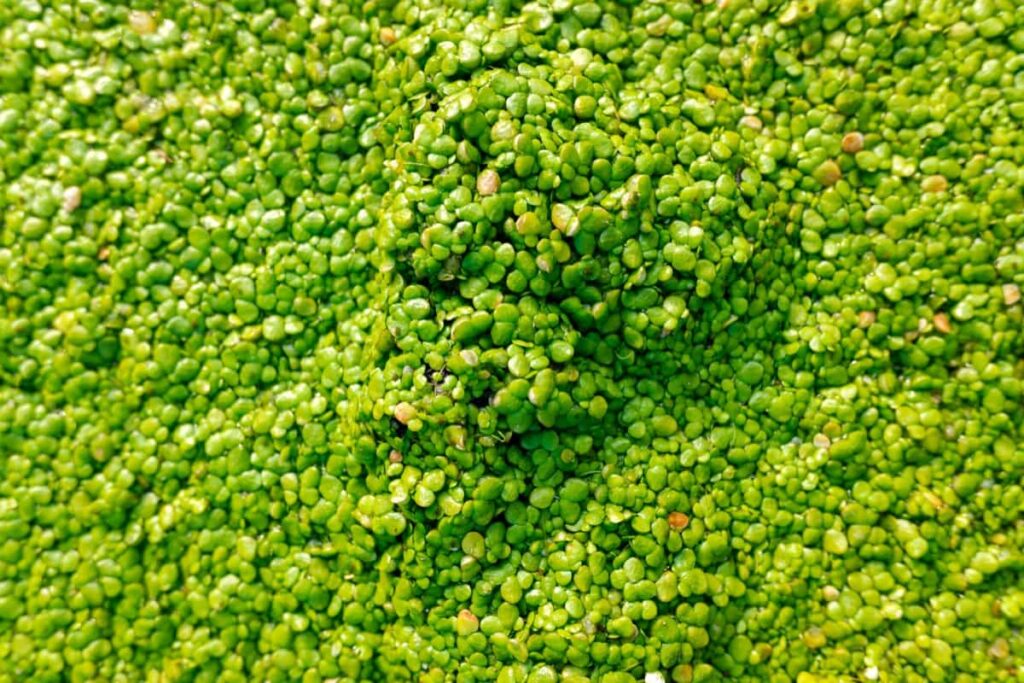Azolla, a remarkable aquatic fern, is revolutionizing agriculture. Its rapid growth and nitrogen-fixing ability make it a natural fertilizer, enriching soil health. Farmers are increasingly using Azolla to boost crop yields, reduce chemical dependency, and support sustainable farming practices. This tiny plant is making a big impact in the agricultural world, showcasing nature’s ingenuity in enhancing food production. Our exploration of Azolla’s applications in farming reveals its potential as a game-changing resource for modern agriculture.

What is Azolla Farming?
Azolla is a free-floating water fern that grows in association with a blue-green alga called Anabaena azollae. This symbiotic relationship enables Azolla to fix atmospheric nitrogen and use it for its growth. Azolla has many benefits for agriculture, the environment, and livestock.
Azolla Characteristics
Azolla is a plant rich in protein, amino acids, vitamins, minerals that can be used as a green manure or biofertilizer for crops, particularly rice. It increases rice yield and quality by providing nitrogen, phosphorus, potassium, iron, zinc, and other micronutrients. Azolla also helps in weed control, pest control, and soil improvement in rice fields. It forms a dense mat on the water surface, blocking sunlight, preventing the growth of other aquatic weeds. Azolla is also used as a livestock feed supplement, improving milk yield, egg production, weight gain, and feed conversion ratio.
It can be converted into biogas, bioethanol, biodiesel, or biochar through various methods. Azolla can also be used for phytoremediation of wastewater, treating domestic, industrial, or agricultural sources, and enhancing aquaculture practices. It can also be used for erosion control, soil stabilization, and carbon sequestration. Azolla farming is an innovative and sustainable way to produce high-quality feed, fertilizer, and bioenergy, conserve water, control weeds, improve soil health, and mitigate climate change.
Significance of Azolla in Agriculture
Rising Demand for Organic Produce
In today’s world, there’s a growing demand for organically produced food. This trend is encouraging more farmers, especially the younger generation, to turn towards organic farming. Despite India leading globally with 30% of organic farmers, it only utilizes 2.59% of its land for organic cultivation. This gap indicates a huge potential for expansion in organic agriculture.
In case you missed it: Azolla Cultivation Business Plan: A Step-By-Step Guide for Growing, Care, Benefits

Challenges in Organic Farming
Many farmers need help due to the high costs of inputs, low productivity, and limited market access. Integrating animal husbandry with crop production could offer an alternative income source, especially as India has significant livestock populations.
The Role of Azolla
Azolla, a small aquatic fern found in warm, wet areas, can play a critical role in this organic revolution. Known for its rapid growth and nitrogen-fixing capability, it forms a symbiotic relationship with the Blue-Green Algae (Anabaena azollae), enhancing its ability to fertilize soils naturally.
Environmental and Agricultural Benefits
Continuously using chemical fertilizers can harm soil quality and decrease microbial activity. Azolla, however, offers a sustainable alternative by improving soil fertility without damaging the environment. It can control ammonia volatilization in rice fields, reducing nitrogen loss and environmental impact.
Azolla in Animal Feed
Azolla is not just beneficial for crops but also serves as a nutritious feed for livestock, including cattle, pigs, chickens, and fish. Its high protein content and fast growth rate make it an economical feed option.
Cleaning Polluted Water
Certain Azolla species, like A. pinnata, can remove heavy metals like iron and copper from polluted water, demonstrating its environmental remediation potential.
Agricultural Applications of Azolla
Nutrient-rich Fertilizer
Azolla has a high content of protein, amino acids, vitamins, minerals, and antioxidants, which can improve soil fertility and crop quality. Azolla can substitute chemical nitrogenous fertilizers to a certain extent and reduce the cost of cultivation.
In case you missed it: Top 10 Best Orchid Potting Mixes in India

Organic Weed Control
Azolla can suppress the growth of weeds by forming a dense mat on the water surface, reducing the light penetration and oxygen availability for the weeds. Azolla can also release allelopathic substances that inhibit the germination and growth of weeds.
Livestock Feed Supplement
Azolla can be used as a nutritious feed for animals such as poultry, pigs, cattle, goats, sheep, and fish. Azolla can enhance animal health, growth, and productivity, as well as reduce methane emissions from ruminants.
Biofertilizer for Sustainable Agriculture
Azolla can improve the soil structure, water-holding capacity, microbial activity, nutrient cycling in the soil. Azolla can also sequester carbon and reduce greenhouse gas emissions from agriculture.
Pest Control Agent
Azolla can attract beneficial insects that prey on pests, such as ladybugs, lacewings, and dragonflies. Azolla can also repel mosquitoes by covering the water surface and preventing their breeding.
Bioenergy Production
Azolla can be used as a biomass source for bioenergy production, such as biogas, bioethanol, and biodiesel. Azolla has a high biomass yield and a low lignin content, which makes it suitable for anaerobic digestion and fermentation.
Phytoremediation of Wastewater
Azolla can absorb heavy metals, organic pollutants, and nutrients from wastewater, improving its quality and reducing its environmental impact. Azolla can also produce oxygen and purify the water through photosynthesis.
Sustainable Aquaculture Practices
Azolla can provide food and shelter for fish and other aquatic organisms, enhancing their survival and growth. Azolla can also improve the water quality by removing excess nutrients, pollutants from the water.
In case you missed it: Sustainable Solutions of Cow Dung Manure: Production Process, Exploring the Benefits and Applications

Erosion Control and Soil Stabilization
Azolla can prevent soil erosion and landslides by forming a protective layer on the soil surface. Azolla can also increase the soil organic matter and bind the soil particles together.
Conclusion
Azolla is a game-changer in sustainable agriculture. Its rapid growth, nitrogen-fixing ability, and versatility as green manure and animal feed make it invaluable. This small fern holds the potential to revolutionize organic farming, enhance soil health, and contribute significantly to environmental conservation.
- How to Raise Pigs in Your Own Backyard: A Comprehensive Guide
- Budget Friendly Sheep Shed Ideas: Cheap and Low-Cost Tips
- How Much Do Cattle Farmers Make: Revenue Streams in Cattle Farming
- Management Pests and Diseases in Your Cotton Field
- Sheep Farming Business Plan for Beginners
- Aquaponic Farming at Home: A Step-By-Step Guide
- Profitable Village Farming Business Ideas in 2024
- High-Yield Aquaculture: Fast-Growing Fish for Farming
- Effective Fish Pond Construction Techniques for Beginners

Where is Azolla available near palghar